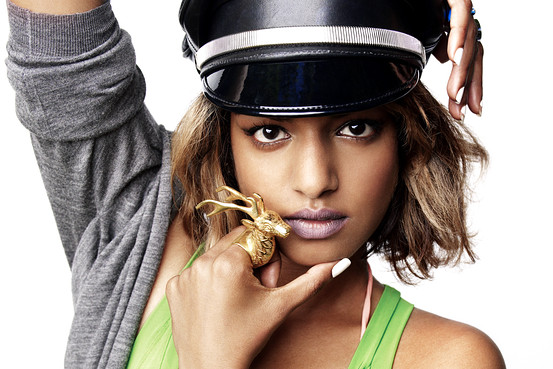Ilankai Tamil Sangam30th Year on the Web Association of Tamils of Sri Lanka in the USA |
|||
 Home Home Archives Archives |
The Songbird of 'Slumdog'by Ethan Smith, The Wall Street Journal, January 30, 2009
Hip-hop artist M.I.A. recently rocketed from the experimental underground to the pinnacle of the entertainment world. "O Saya," her collaboration with Indian composer A.R. Rahman from the "Slumdog Millionaire" soundtrack, is one of three nominees for the best-song Oscar. And her track "Paper Planes" is in contention at this year's Grammy Awards for record of the year -- the Recording Academy's top honor. Born Mathangi Arulpragasam in Britain, the future singer returned with her family to her parents' native Sri Lanka when she was 6 months old. The family, who are members of Sri Lanka's ethnic-Tamil minority, moved to Jaffna, in the island nation's north. Not long afterward, the country erupted into civil war between the Tamil Tigers and the Sri Lankan government, and violence consumed Jaffna.
At age 10 she fled with her mother, elder sister and younger brother first to India and then back to London, where her mother now works as a seamstress and M.I.A. attended art college. Ms. Arulpragasam says her harrowing life has informed both the lyrics and sound of her songs. After her song "Paper Planes" was included last year in a trailer for the stoner comedy "Pineapple Express," it became M.I.A.'s first hit -- and an unlikely one at that. The song's signature element, gunshot sounds that are part of its rhythm bed, generated controversy. The song's refrain is the seemingly aggressive chant: "All I wanna do is" -- Pow! Pow! Pow! Pow! -- "and take your money." But M.I.A. calls the song an ironic comment on the way Westerners perceive Third World immigrants.
Ms. Arulpragasam now lives in Los Angeles, where she is starting a family of her own under far gentler circumstances than the ones in which she was raised. She and fiancé Benjamin Brewer are expecting her first child as soon as this weekend. WSJ: You're nominated for an Oscar and a Grammy as the conflict in Sri Lanka is heating up, with accusations of very ugly behavior by both sides. Does that make for a bittersweet moment? M.I.A.: I'm also nominated for a Brit Award in England. But for me nominations are not like a musical thing. It's more like me having a platform. The point of success is being able to tell a wider audience about the situation in Sri Lanka. Your lyrics address issues like human trafficking and guerrilla warfare in a telling-it-like-it-is, almost amoral way that's similar to the way gangsta rap treated drug dealing and urban violence in the 1990s. Do you see a connection? I've seen, with my own eyes, a lot of s- go down. I've seen people get massacred in front of me. My school was burned to the ground when I was 6 years old. When you come from that kind of background, you do become matter of fact, and tell it like it is. What do you say to critics, like the Sri Lankan rapper Delon, who accuse you of glorifying terrorism? If you think lyrics about guns are bad, I shouldn't have been shot at when I was 7 years old. Your Oscar-nominated song sounds very different from your own music. What was it like collaborating with A.R. Rahman on a lushly orchestrated song for a Hollywood movie? I'm not used to recording in $1 million studios. I approach music as an experimental artist. I go out in the street and record people in their element; I play around with drum machines and samplers. I make a whole bunch of mess and see what works. A.R. Rahman works in a much more professional way than I do, with a lot of professional people. But I love him musically. He's been the only composer in every Tamil film that I've watched and liked. Was it set up as a meeting of two Tamil stars? When I first met A.R. [while recording her album "Kala"], I wasn't that big. My music wasn't Tamil-sounding, it didn't sound like average music coming out of the West, but it wasn't mainstream Indian, either. Your father was involved in the Tamil independence movement in the 1970s and '80s. Was he a Tamil Tiger? He was a member of a group called EROS -- Eelam Revolutionary Organization of Students. He was an intellectual who intellectualized the war, even while it was going on. He tried to mediate between the [Sri Lankan] government, the Indian government and the Tamil Tigers. That was his dream, to mediate an agreement. When he failed, he got discouraged and quit politics. He moved to Cambridge to research and write books about sustainable development. Your first child is due the night before the Grammys. Are you going to the show? And do you plan on performing? We're planning a home birth, but it might be a Grammy birth! Eating a hot curry could make me go into labor, so imagine what getting on stage with Jay-Z, Lil Wayne and T.I. would do. Everyone's been very understanding. Write to Ethan Smith at ethan.smith@wsj.com ----------------------------------------- Corrections & Amplifications |
||
|
|||
 As a child, Ms. Arulpragasam rarely saw her father, Arul Pragasam, who was involved in the Tamil-separatist movement -- though she says he was part of a more political faction than the violent and better-known Tigers.
As a child, Ms. Arulpragasam rarely saw her father, Arul Pragasam, who was involved in the Tamil-separatist movement -- though she says he was part of a more political faction than the violent and better-known Tigers.